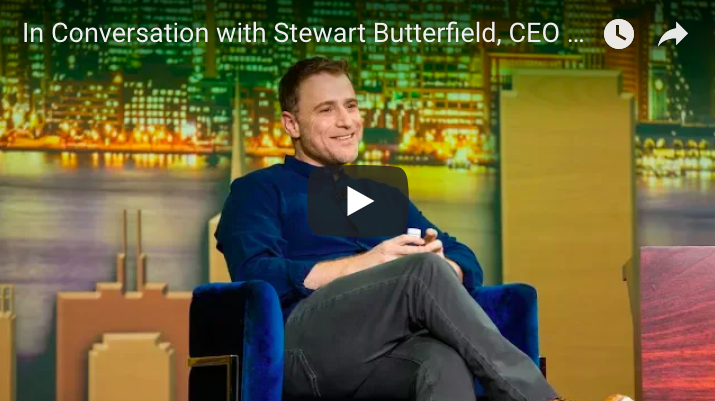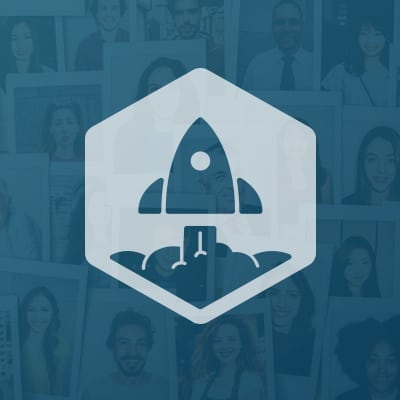We were so excited to have Slack’s very own CEO and Co-Founder, Stewart Butterfield, back on our stage this year to kick off SaaStr Annual 2018! Alongside Forbes reporter, Alex Konrad, Stewart and Alex took center stage as our opening keynote to have an open discussion on the workplace of the future.
It was really special for us to have Stewart back since he was actually one of our speakers at the first SaaStr Annual in 2015 conference, right when Slack was beginning to gain momentum. Under Stewart’s leadership, Slack has only continued its momentous growth and he shares his vision for continuing innovation in the workplace during this session.
TRANSCRIPT
Announcer: Please welcome Alex Konrad, staff writer at Forbes, and Stewart Butterfield, CEO and co‑founder of Slack.
Alex Konrad: Wow, every year this place has to get a bigger venue. There are more faces here. You were one of the first speakers ever at SaaStr, in 2015?
Stewart: Yes.
Alex: What was the crowd like then?
Stewart: I don’t know because they got the bright lights, so about the same.
Alex: Were people accosting you as you tried to walk through SaaStr yet, or did that only come later?
Stewart: No, I think that was later.
Alex: I got to tell you guys, I saw Stewart last at Web Summit in Portugal. I ran into him backstage. We weren’t supposed to be talking together. Fans were coming up to you, business people asking to take selfies with you, asking to pitch you ideas.
Stewart was so nice that he wasn’t really good at saying no. It was really funny. I watched one guy try to pitch him an idea for about two minutes. It was funny because I just thought Slack has fanboys and fanwomen at this conference. I didn’t expect to see that.
Is that a surprise for you, or is this something you’ve gotten used to?
Stewart: I guess I’ve gotten used to it, but it is still a little bit of a surprise. I don’t know that I could reverse engineer the whole thing and explain exactly how we got to this state. It’s obviously been the critical advantage for us.
There’s millions of people using it. We work really hard. We’re smart, and we’re trying to figure out how to turn money into customers. We haven’t cracked that, the scaling the business through go‑to‑market programs.
Almost all of the growth has been people liked it. They recommended it. There’s a little bit of brand affinity. That’s been super, super important for us.
Alex: Does it feel like the same company at this point? You’re now one of the biggest, still private, enterprise software companies. Three years ago, you were on that trajectory, but it wasn’t quite as proven.
Does it feel like the same company? Does it feel like the same job?
Stewart: Definitely not. I don’t remember what part, when in 2015, the event was. By the end of 2015, we had 80 people. By the end of 2016, it was 320. Actually, I think I’m off by a year.
It’s been more than 100 percent growth. You talk about the company in many senses. The most important and real sense if you’re working there is the people. We’re about 1,000 now. That’s profoundly different than 50, 60, 80, 100.
Alex: Wow, and six million monthly users, right? Does the product have a different focus when changes are happening for six million people versus a lot fewer?
Stewart: Yes, we have to be a lot more careful now. There’s a lot more complexity and a lot more interdependence. It’s not just in Slack the product, but the way that it’s deployed, especially at larger organizations, is people will select many dozens, sometimes more than 100 of the apps in the app directory. There’s about 1,000.
Also, the largest customers, people have built thousands of internal integrations. It’s not just an outage affects people’s daily work. Although, obviously, that’s true. Changes to API methods, deprecating them, any kind of technical change has big ramifications. There’s a whole exoskeleton of change management.
Alex: I can see the audience. I’m curious. Do you guys mind raising your hand if you guys use Slack at your business today? It’s the vast majority of hands, almost everyone.
Stewart: I was just at a conference. I was in lineup for our party. I was going to go in. The people were introducing, and said, “Oh, this is the CEO of Slack.” This woman said, “Oh, I hate Slack.”
[laughter]
Stewart: I always do the, “How many of you use it?” How many of you hate it?
Alex: No one’s doing it. I see one hand, one brave hand. It is interesting. I’m sure the spread of businesses represented here, we probably have a lot of entrepreneurs, a lot of people working for bigger companies, investors, all using the same product.
Is that a challenge for you, or is that in a way helpful that you’ve got so many different types of customers, and especially with 150 enterprise customers now?
Stewart: Yeah, the variety is bewildering. We were actually talking about this backstage, about this is not a business application. It is a group of people aligned around the achievement of a goal. That’s wedding planning. People use Slack for wedding planning all the time.
People use Slack at Capital Law, at Liberty Mutual, Moody’s, and big financial services companies. They also use it obviously in three, five, eight‑person startups. They also use it at farms, at multiple police departments, detectives passing off case notes to the new detective coming on shift. They use it at dental offices, hospitals.
To a certain extent, I guess that makes it more challenging. In one interesting way, it makes it a little bit easier because it forces us to stay focused on that bottom level, “What’s common to all organizations? What’s common to all teams, the fundamental communication layer?”
Alex: When you look at the copycats and challengers that have come up over the years, have you at this point been able to figure out looking back what was your killer differentiation? How iterative has this been in terms of getting that escape velocity to be the viral product that everyone in this room is using when there are a lot of other options?
Stewart: It’s fascinating. Like I said, this is more retrospective theories and post facto analysis than we knew what we were doing all along, had a grand plan, and then executed against it.
The most important thing, and we have not cracked the nut on this yet, is explaining what Slack is. I had this experience. I was at an event. There’s dinner. There’s about 10 people at the table. It’s a big round table. There’s a bunch of executives there.
I’m 90 seconds into my explanation of what Slack is to someone, and then another person across the table who actually uses it leans across and says, “It replaces email inside your company.” The person to whom I was trying to explain it was like, “Oh, OK.”
The understanding of what it’s for is much easier in an early adopter crowd because if you happen to have used IRC before, if you’re comfortable with messaging apps, you can see what the potential might be. We have not exhausted the entire universe of people in that position.
We’re moving more and more into situations where someone is like, “This is another dumb thing that IT is making me do,” as opposed to, “I am enthusiastically trying to transform our organization and improve our communication.” When we get there, I think it becomes even more critical that we’re focused on the dead basics.
There’s a big focus for this year on things like launch time and speed, reliability of the apps. It’s not really sexy. We say this is going to be a very boring year. Sorry, [inaudible 8:49] .
Alex: How would you rate the average Slack user’s productivity boost from using Slack? Does Slack make everyone’s life better? Does it only make some people’s lives better?
I’m sure you guys survey your users. You try to check this. How do you feel about the boost that people are actually getting?
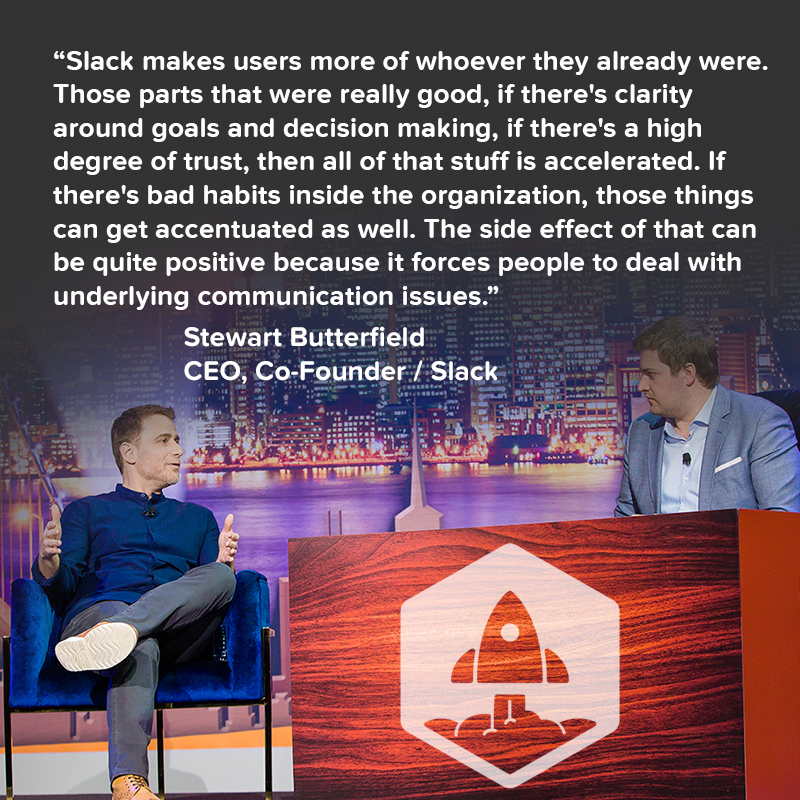
Stewart: It accentuates or accelerates everything. I’m not going to cuss, but there’s a saying like, “Becoming rich doesn’t make you a a‑hole. It just makes you more of who you already were.” I think that’s true of team users of Slack. It makes them more of whoever they already were.
Those parts that were really good, if there’s clarity around goals and decision making, if there’s a high‑degree of trust, then all of that stuff is accelerated. If there’s bad habits inside the organization, those things can get accentuated as well. The side effect of that can be quite positive because it forces people to deal with underlying communication issues.
This might just be my own preoccupation because of where we’re at as a company with 1,000 people. The performance of the organization, the performance of the team as distinct from the performance of individuals on a team seems to be the most critical factor.
When we think about Pearson chart, it doesn’t matter ‑‑ revenue, users, whatever ‑‑ and we’re here today, we think about where we’re going to be 10 years from now, the delta and possible outcome, which is really wide.
What is going to explain that is how well we perform at the team level. I think that’s truer and truer for more and more organizations. I was just on a panel a couple of weeks ago on the over too broad topic of disruption, and how do you deal with disruption.
The critical thing seems to be organizational agility, alignment, the ability to respond to respond to external changes. If you imagine companies that are in a very vulnerable position like on low points of the strategic fitness landscape, even if they didn’t make any bad choices themselves, but like Blockbuster or Barnes & Noble in noble in 2002, the currents of disruption are so powerful, and so strong.
If the organization is brittle, and unable to respond to that, they’re just going to get smashed. Those might be extreme examples because they’re probably hard to…Maybe there were some crazy Hail Mary you could have done, but that advantage is no less real for five person teams inside of some large company, for 10‑person companies, really for any group of people working together.
Alex: One thing I can’t help but think when I hear that is at the same time that Barnes & Noble gets challenged by all these giant forces, what has been the equivalent in the workplace? We still email six hours a day, and I’m sure everyone here who uses Slack probably emails about as much, or still a high volume at the same time.
It’s not like Slack killed email. I know that wasn’t what Slack was supposed to do, but it’s how some people started to conflate this. What is changing, or is there a fundamental shift that Slack is part of?
Stewart: I think there is a fundamental shift, and I think it has, in some organizations, completely killed many use cases for email. You use the single word email. It indicates it as like massive. It’s almost like saying TCP or HTTP or something like that.
There are so many completely distinct things that it’s used for ‑‑ a security passport for resetting your bank password, a stream of notifications for your HRIS or your expanse management system so that you know you have to go approve somebody’s expense report. Obviously, just communication. Receiving marketing newsletters and so on, and so on, and so on.
For teams where the bulk of their communication is internal, and software engineers are the canonical example, as distinct from sales people where they do have a lot of external communication, it can completely replace the use of email. That doesn’t happen at every company. It doesn’t happen right away, but it will.
I remember. I first got online in ’92, so a little over 25 years ago. I was right at this point where the first most progressive companies were starting to replace their existing internal communication systems with email.
Those existing systems might have been literally electric typewriters, mimeograph machines, piece of paper rolled up and stuck into cubbyholes, and stuff like that. ’92, we’re still three years away from Windows 95, before personal computers were a huge phenomenon where they broke out outside of the geek sphere.
That transformation, for businesses to begin using email, took a whole generation. There was people who aged out of the business, and probably barely touched email despite the fact that it’s now 2006, or something like that.
I think the advantages of Slack, and systems like Slack ‑‑ to be clear, we’re not going to have 100 percent market share in the fullness of time ‑‑ have such huge advantages over the use of email that the replacement of email as a system for internal communication is just inevitable.
Alex: 5 or 10 years from now, whatever number you want to use, I’m curious, what does the ideal workflow look like to you? How much time am I spending in a software program versus meeting with people face‑to‑face, or not plugged in? Am I plugged in pretty much my entire work day?
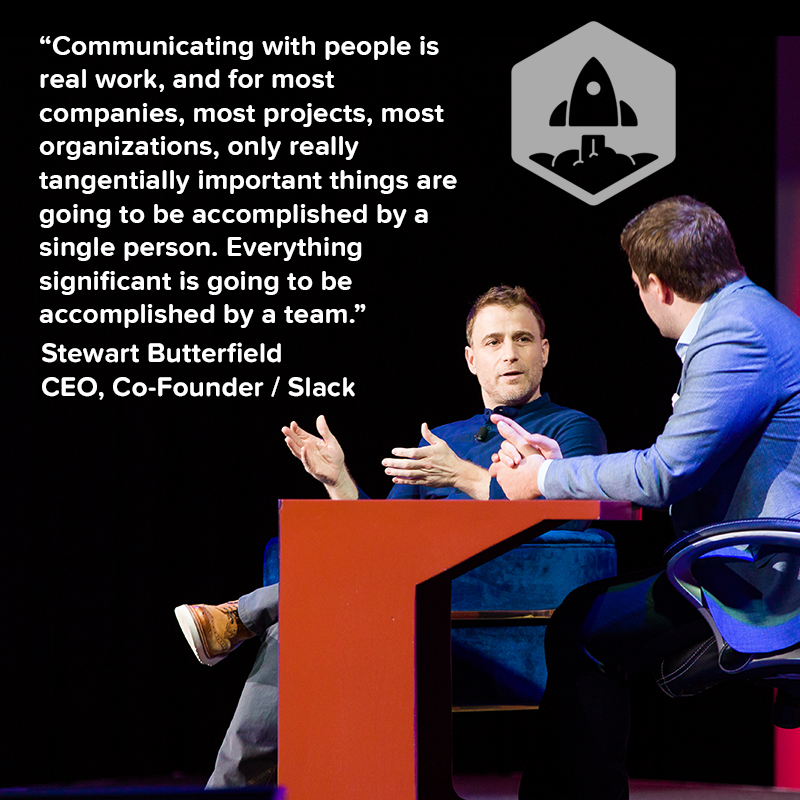
Stewart: I’m plugged in my entire work day now, and probably most of the people in this room are. It doesn’t mean that I’m always attending to my laptop or my phone, but that is the way interruptions happen as opposed to someone running into the room, and hollering your name.
People spend a lot of time in Slack. Like a lot of minutes. We don’t regard that as a vanity metric in the way that an ad based consumer service might. In fact, the general instinct is if people spent 10 minutes less a day in Slack, maybe that would be good.
I want to digress for just a second to say that I don’t think the use of Slack is distinct from real work. Communicate with people is real work, and for most companies, most projects, most organizations, only really tangentially important things are going to be accomplished by a single person. Everything significant is going to be accomplished by a team.
Alex: Let’s redefine it. Let’s say there’s the work that my company does that pays my salary, and is differentiated. There’s the work that we do to make that happen surrounding that core product.
If I’m talking in Slack about the products I’m building, it’s helping me build the product, but I’m not actually coding a product, or designing a new shoe or something like that. I’m communicating about it with my team.
Stewart: Yeah. I don’t agree with that just because the…Here are some things that people do in Slack. Network operations engineers doing incident response. Their service is down, and they’re trying to figure out why.
That communication back and forth with paralyzation of the investigation. Some people looking at the database, some people looking at the load balancers, some people looking at the front‑end servers, people reporting back, sharing their hypothesis. That’s definitely work.
Shifted completely to a really intense argument about allocation of spend in the Q3 marketing budget or something like that. That’s definitely work as well. Making those decisions, gathering the input, communicating, getting that clarity is just as important as whatever else goes into that.
That might be like meetings with the agency, and sign off on the creative, and all that kind of stuff. There’s plenty of people inside the company, and they tend to get paid more. I’m not saying that that’s the way the world should be whose whole job is just communication.
If you’re a manager, that’s literally the only thing you do. You read and write messages, you have one on ones. There’s meetings. Generally, there isn’t any other work product besides the coordination of the team.
Sorry, to go back to your original question, if you think about the role that email plays, and this is why that guy leaning across the table, and saying it replaces email inside your company is so perfect, it’s this window you have into all of the workflows.
It’s how contracts that are going back and forth between two legal teams are addressed and how that process happens. Like I said before, the notifications. You have an expense report to approve. For a lot of companies, that is where the argument about the Q3 marketing budget allocation happens.
You have this really tiny window when you’re using email, especially if you’re like a 5,000, 10,000, 50,000‑person company. Tiny little window into what’s going on.
The switch to Slack opens that aperture really wide, but Slack is not going to replace your CRM. It’s not going to replace your HRIS. It’s not going to replace your development tools. It’s not going to replace your ad server or analytics, or any of the things that individual functional roles used to get their work done.
There’s definitely a long‑term circular trend going back at least 10 years at this point, but maybe a little longer. I think that stretches out for another like 50 years, which is there’s just more and more software. It gets more and more specialized, and it suits more and more purposes.
We’re a company, like I said, 1,000 people. We buy from like 150 different vendors. Well, I have no way to verify this, but according to Netscope, large enterprises now buy from 1,000 different vendors. People have this image like there’s SAP, Oracle, Microsoft, Salesforce, and then the list drops off pretty quick after that.
The reality is none of those companies is capturing more than like 10 percent of the total software spend. In most cases, I think it’s even less than that because they’re so much. My favorite recent example is a tool called OfficeSpace which is used by the facility team to do seed planning.
Seed planning, it sounds like it’s not that important. If you’re not on the facility team, probably never really occurs to you, but you could imagine just the mind numbing error prowling process of using a drying program, selecting a seed, pasting it.
Paste, paste, paste, paste, paste, paste. Select all, align horizontal. Paste, paste, paste, paste, paste. Stream it vertically. Copying over people’s names one at a time. Automating that saves like, I don’t know, 40 weeks of someone’s work per year. Allows them to focus on things that actually require some human intelligence, and creativity, and they cost maybe 2,000 or 5,000 bucks.
You’ll see that over, and over again, and narrow, and narrow niches like four legal teams contract management, and automated summarization, and more elaborate version controls systems. It doesn’t have to be legal. It can be IT, it can be recruiting, it can be sales, it can be marketing, whatever.
In a world where that’s happening, I think Slack is a great hub for collaboration. It doesn’t replace any of the business logic. It doesn’t replace the data store, but when I want something from Salesforce, for example, or a Salesforce customer, I enter that from Slack.
I’ll go /accounts, and then the name of a customer. Hit enter. 99 percent of the time I get back what I wanted, which was name of the account executive, renewal date, ACV, stuff like that. If I want more detail, I hit the button, and I go off into Salesforce, and I can do way more elaborate stuff.
I think that will be true for Salesforce. It’ll be true for PagerDuty. It’ll be true for GitHub. It’ll be true for continuous integration tools. It’s a pointer. People reflect off of that, and if you’re in marketing, you’re going to be heads down in a bunch of marketing tools. If you’re in finance, you’re going to be in finance tools, but the hub for all that stuff becomes Slack.
Alex: I’m curious, how many people in the audience work with a company, or have started a company that integrates with Slack right now? A little less than half. Maybe a quarter.
Do you think that you guys end up king makers with other and more specialized business software, or what happens when Slack is this hub, or what might have seem like a home page for work a few years ago?
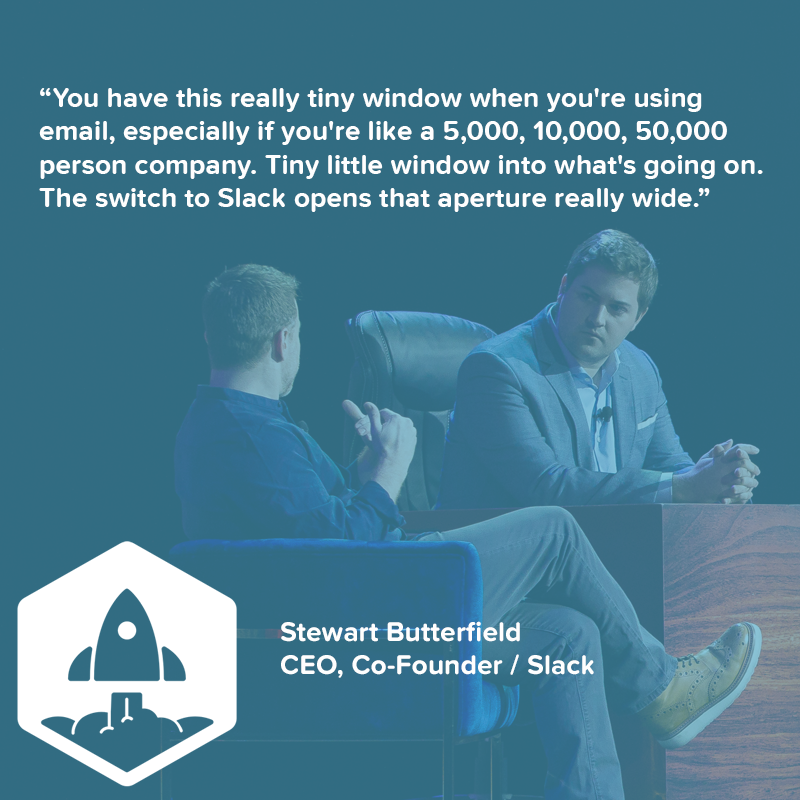
Stewart: That’s interesting. I’ve never been asked that before, and I would hope not because I think that would reduce the utility of the platform. Same way that there are no king makers on email. That’s relatively neutral.
Sometimes when we talk to larger companies…the last year, we announced partnerships and did a lot of interesting work with Google, with Oracle, with SAP with ServiceNow. I can go down the list.
Sometimes, partners are a little hesitant at first. Feel like we’re going to disintermediate them or replace them, or something like that. First of all, it’s almost impossible to do anything well at all, so we already got one thing that we’re trying to do well, and the universe of software is expanding exponentially.
There’s probably hundreds of companies represented here, and many of them are going to be in brand new niches. Like extending the ecosystem, but we want anyone to be able to use it for any purpose.
There’s 200,000 registered developers in the Slack platform, most of them doing internal division, and if we were somehow to impede them or impose toll gates or otherwise try to capitalize on that, I think it would really bite us because the freedom, and the openness of the platform is essential for people getting utility out of it.
Alex: I’m curious, and this might be a question on the minds of some people in the audience. How much does voice play into your strategy right now, and where you see work moving? We see Amazon, and some of these big companies that have made home voice based devices now looking at the workplace.
Is there a way to use Slack effectively with voice in the future, or is this something you’re thinking about?
Stewart: I could definitely see it. It doesn’t happen right now though. I’m sure that there’s Alexa skills for Slack, and stuff like that.
In my own personal experience, it’s pretty mundane at this point. I do sometimes when I’m walking down the street, and I got a bunch of things going on, and I’m trying to get to a meeting or whatever, I put the insertion point into the message composition thing, and then press the microphone button, and then dictate.
That’s something that there was software for 30 years ago, and now it’s finally good. The interface is for switch channels, read me a summary, ask someone this question, post this message, I think, are a little bit further away, and also in offices obviously.
It really depends on the physical configuration because voice is hard to contain, and if you’re OpenOffice plan, and everyone is just yakking to their sidekicks, it’s like when you’re at home watching TV, and someone does something in the TV show, Alexa, blah, blah, blah, blah, and then your thing goes off.
I think that’d be tough, so it’s a little bit harder to imagine. However, it’s really, really convenient to be able to do that in the applications where it’s already been successful like, for me, cooking. Setting timers. Asking for conversions, stuff like that. I don’t see any reason why that wouldn’t extend into business.
Alex: Cool. I am curious, if you were starting over, would you be trying to build a platform, or would you be starting with a new hyper focused product? I wonder, if we had a saturation point, at some point with different verticals that are right for multi‑billion‑dollar companies to emerge like Slack has.
Stewart: There’s the intention that you have going into it, and then there’s what actually happens. I think there was definitely conversations and idle speculation about Slack being a platform at the moment that we were getting started in developing it.
We definitely thought of it as a product. Now, that’s definitely not true anymore because communication is a platform like activity. I’m not sure that that distinction really drives a lot of decision making inside the company. It’s not like we’ve…
Someone when we were discussing what we should do about something says, “Tat, tat, tat.” We remember we’re a platform or something like that. It does push us towards or draws towards certain opportunities.
It really depends. To be honest, we were incredibly lucky. The timing was amazing. It’s so hard to know in advance. That choice upfront, it’s more like figure out where you can generate real value for people and pursue that. If that ends up being a platform, good. If it ends up being a product, good.
That’s I think one thing that we do stay focused on completely because in the long term, the measure of our success is the amount of value we deliver to customers.
Alex: I can’t let you go without asking about the news this morning. I don’t know if you guys saw, but Slack hired its first CFO. You promoted Allen Shim, I believe. He’d been with you guys for some time. Some of the coverage said, “Is this a first step or a major step towards thinking about a public offering?” What is behind this move and what does it mean for Slack?
Stewart: Well, I mentioned 80 people, 320, 650, 1,000, that kind of growth. The complexity increases, like the business operations and business systems. Complexity increases. We have much richer product offering than we used to have.
That we have a whole organization built around new platforms specifically in developer relations. We have a relatively new customer success team, which is just ploughing into some deep problems on change management in large companies.
This is just part of the trajectory. Having that structure. We added our first independent director Sarah Friar, CFO of Square about a year ago. I’m not trying to be coy or anything like that.
There’s really nothing interesting to say about an IPO. It’s the most likely outcome for us. It’s some period of time away from now. More than a year, and it could be longer than that. I don’t really know, but we made the decision literally years ago that we want to begin to operate with the discipline, and internal controls of a public company.
That’s something we’ve actually been really good at.
Alex: For the entrepreneurs in the room, do you think it’s better to build towards that as the ultimate dream as it might have been in the past? What do you think is the best way to think about ultimate outcome?
Stewart: There’s a book called “Barbarians at the Gate” which is about like KKR’s work takeover of Nabisco, and RJ Reynolds.
A different era of business, but I remember reading that, and always having these fantasies like, “Hey, we don’t have to IPO. We don’t have to be acquired. We’ll just go to a bank, and we’ll borrow $20 billion, and we’ll buy‑out our investors. It’ll be management buy‑out, and we’ll just have this big debt, and we’ll pay it off.”
I don’t think that that’s likely to be the outcome. It really depends. I worked as CEO of Flickr, and we sold to Yahoo. I have lots of friends whose companies were acquired. It can be a great outcome for people.
There’s obviously a lot of interest in exploring alternatives to traditional public markets. Different markets, different structures. There’s some longer‑term transit we’ve really benefited from. Like the availability of capital to private companies on a scale that was just completely unprecedented. We’ve raised over 800‑million bucks.
I don’t know. The process of IPO‑ing, and then the state of being a public company I’m not sure are goals that people want, but this point of unnecessary step if you’re going to scale beyond a certain point.
I know for me, there’ll never be another opportunity like this. I can’t start another company and then end up on the same state because I’m not smart enough to make this happen. If I ever wanted to see how far we can take it, this is the time to do it.
Alex: I’ve seen you say at conferences in the past that if the money is cheap enough, you should take it in terms of taking investment. Do you still feel that way, or what would be your advice in that regard?
Stewart: Yeah. When you say cheap enough, I think you have to factor in not just the dilution, percentage ownership, and things like that, but the degree of control that you’re giving up. If money is so cheap, it’s…I haven’t checked the markets since we’ve been here, and I’m not someone who obsesses over day‑to‑day changes.
This may be a good closing thought, because I can see the thing flashing. I was born in stagflation, the ’82 Volcker. 18‑percent interest rates bankrupted my father, who was a real‑estate developer.
I graduated high school in ’91 in the terrible recession, worked through the dot‑com crash, literally held Lehman Brothers shares. Over the weekend, they went bankrupt. I didn’t know that shares could go to zero, but it turns out they can.
Having cash available when stuff hits the fan, I think, is an incredible position to be in. Just as a hedge, I think it makes sense.
Alex: Thanks for sharing your thoughts with everyone. A round of applause for Stewart.
Stewart: Thank you.

